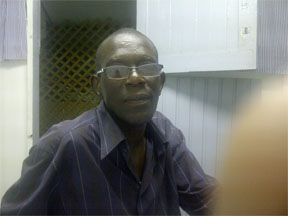A Guyana Energy Agency (GEA) inspector was sent packing last week after he did not volunteer to take a polygraph test.
The man Vernon James who is based in Linden said that he fears that more of his colleagues will fall victim to this “injustice”.
James yesterday travelled from his home to tell his story.
He said that it was the GEA head Mahender Sharma who give him his marching orders. Efforts by Stabroek News to contact Sharma were futile.
James explained that he began working with the entity in 1982 when it started but was dismissed in January 2004 after allegations were made that he was unfit. “I had domestic problems so I couldn’t work”, he said.
In October 2004, he said he was re-employed.
James said that from 2010 to this year when approached he volunteered not to take polygraph tests.

He said that on February 21 he was summoned to the entity’s headquarters in the city where he later met with Sharma and other senior personnel. He said that when he entered the room, Sharma told him that in 2010 he refused to take the polygraph test. James said that he corrected Sharma by saying that he did not refuse but rather he had indicated that he would not volunteer.
James recounted that in October 2010, he was summoned to a meeting at the Office of the President and it was only when he arrived that several of his colleagues who were already there informed him that it was about polygraph testing.
He said that he and everyone else who was there later went into a room and there “I was greeted with my name already on the table, which I sat behind”. According to James a man was there explaining how the polygraph is done. He recalled that at some point he asked the man how accurate the test was. “The guy said 95% and I asked what happened to the 5% and he said he doesn’t know”, he added.
Shortly after, James said that an official of the Office of the President entered the room and proceeded to tell them who will take it, when and where. He added that persons from other agencies including law enforcement officers were also present at the meeting.
He said that on the following day he went to a hotel in Campbellville and proceeded to a particular room to have the test done. He said that while there “my sinus raise up” and he was advised by the person administering the test that he should not do it in that state.
James made reference to a paper that he was given to sign as consent for the test to be done. He said that paper stated that the test should not be something that is forced but rather it should be free and voluntary. It was at this point he said that he told the man that he was not comfortable taking the test. He recalled that he asked if he would see the results first and was shocked when he was told that it would have to be first sent to the official’s office then the GEA.
He was then taken back to the office in a GEA vehicle which collected another employee and took them to the hotel he was at.
James said that his superiors questioned him as to why the test was not taken and he explained that it was because of his sinus problem. He was told that arrangements were going to be made to have the test done the following day. It was then he was informed that there were several complaints about harassment and taking money from people against him.
He said that he was approached in 2011 but declined to take the test. According to James when he declined to take the test in 2012 he was told that if he did not take it, his contract would not be renewed.
James said that he was surprised when it was renewed in January this year.
He was adamant that he wanted to share his story since what is being done was wrong. He said that one other inspector was recently dismissed and ten persons were said to have failed the test so far.
“I feel for the younger ones” he said while pointing out that the tests are unconstitutional and there is nothing in the labour laws about such actions being taken against employees.
He called for an end to this practice which he said will result in more persons being dismissed.
In 2009 Luncheon said the government intended to make the practice of polygraph testing an annual exercise that will ensure the public can have complete trust in the authorities that serve them.
Polygraph testing was first used in 2008 on the Customs Anti-Narcotic Unit (CANU) with all 32 members of the Unit being tested. Nine individuals failed and their services were terminated.
The tests were extended to include employees at the Cheddi Jagan International Airport, Timehri, the GEA and the Narcotics Branch of the Guyana Police Force stationed at the airport.








